Russian contemplation of deploying nuclear weapons in space stirs major international security concerns, with potential severe implications for satellites, global communications, and the integrity of outer space.
Russia’s Consideration of Nuclear Weapons in Space Raises Significant Concerns
Tensions around global security escalated following reports suggesting that Russian President Vladimir Putin is contemplating the placement of nuclear weapons in space. High-altitude nuclear tests conducted in the 1960s, such as the United States’ “Starfish Prime,” highlighted the after-effects of nuclear detonations above the Earth’s atmosphere. These tests established that unlike terrestrial nuclear explosions, space-bound detonations do not unleash a mushroom cloud or a heatwave but do generate a substantial electromagnetic pulse (EMP) and can increase radiation levels in the Van Allen belts.
Currently, space is subject to significant radiation risks posed by cosmic rays and the Van Allen belts filled with charged particles. If nuclear weapons were to be detonated in this environment, they could introduce more high-energy particles, which may persist in orbit. This represents a grave risk to satellites, spacecraft, and astronauts.
Moreover, the deployment of nuclear devices in space could disturb the Earth’s atmospheric and magnetic defenses, potentially leading to unforeseen disruptions in weather patterns, communications, and the natural behavior of wildlife.
The contemporary space domain is densely populated with satellites, including large constellations like SpaceX’s Starlink, making the consequences of space-based nuclear explosions potentially much worse today by threatening the infrastructure of GPS, communication, and scientific investigation.
The legal ramifications are also a concern, as the Outer Space Treaty of 1967 clearly bans the placing of nuclear weapons in orbit, a treaty to which Russia is a party. As such, the deployment of nuclear arms in space by Russia would contravene international law.
The contemplation of nuclear armaments in space by President Putin is not a singular national issue but a matter of international significance, given the multiple threats it poses to global communication networks and the sanctity of space as a domain for peaceful activity. International discussion and engagement are required to maintain space as a weapon-free zone and uphold longstanding treaties.



